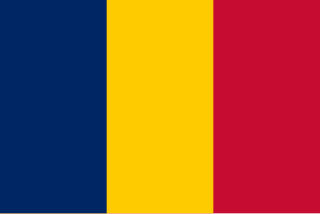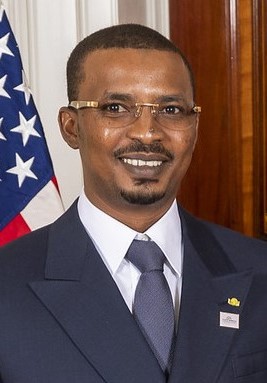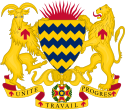Chad, officially the Republic of Chad, is a landlocked country in Central Africa. It borders Libya to the north, Sudan to the east, the Central African Republic to the south, Cameroon and Nigeria to the southwest, and Niger to the west. Due to its distance from the sea and its largely desert climate, the country is sometimes referred to as the "Dead Heart of Africa".

Chad, officially the Republic of Chad, is a landlocked country located at the crossroads of North and Central Africa. It is bordered by Libya to the north, Sudan to the east, the Central African Republic to the south, Cameroon to the southwest, Nigeria to the southwest, and Niger to the west. Chad has a population of 16 million, of which 1.6 million live in the capital and largest city of N'Djamena. With a total area of around 1,300,000 km2 (500,000 sq mi), Chad is the fifth-largest country in Africa and the twentieth largest nation by area in the world.

François Tombalbaye, also known as N'Garta Tombalbaye, was a Chadian politician who served as the first President of Chad from the country's independence in 1960 until his overthrow in 1975. A dictatorial leader, his divisive policies as president led to factional conflict and a pattern of authoritarian leadership and political instability that are still relevant in Chad today.

Idriss Déby Itno was a Chadian politician and military officer who was the 6th president of Chad from 1991 until his death in 2021 during the Northern Chad offensive. His term of office of more than 30 years makes him Chad's longest-serving president.

Chad holds elections on national level for a head of state – the president – and a legislature. The president is elected for a five-year term by the people. The National Assembly has 155 members, elected for a four-year term in 25 single-member constituencies and 34 multi-member constituencies. Chad is a one party dominant state with the Patriotic Salvation Movement in power, although according to the African Union, elections in Chad are generally free and fair. Human Rights Watch, however, has criticized the election process in Chad, arguing that they have problems such as electoral fraud, multiple voting, underage voting, and low voter turnout.

Chad was a part of the French colonial empire from 1900 to 1960. Colonial rule under the French began in 1900 when the Military Territory of Chad was established. From 1905, Chad was linked to the federation of French colonial possessions in Middle Africa, known from 1910 under the name of French Equatorial Africa. Chad passed in 1920 to French civilian administration, but suffered from chronic neglect.

The Chadian Progressive Party, known as the National Movement for the Cultural and Social Revolution for the last two years of its existence, was the first African political party in Chad. It was a regional branch of the African Democratic Rally (RDA).

The Chadian Democratic Union was a political party in Chad.

Chadian Social Action was a political party in Chad.

Presidential elections were held in Chad on 3 May 2006. A referendum in 2005 had led to changes to the constitution that made it possible for President Idriss Déby to run for a third term; having come to power in December 1990, he had previously won elections in 1996 and 2001. Despite a serious rebellion based in the east of the country, the elections were held on schedule; Déby was re-elected with about 65% of the vote, according to official results. The main opposition parties boycotted the election.
The African National Party was a political party in Chad. PNA was founded on January 30, 1960, through the merger of remnants of four parties based in the Muslim-dominated northern Chad; African Socialist Movement, Chadian Social Action, Independent Democratic Union of Chad and Grouping of Rural and Independent Chadians. Initially, PNA held 25 seats in the National Assembly, but the party suffered from defections to the Chadian Progressive Party, first the number of MPs went down to 17 and then to ten. In April 1961, PNA merged with the Chadian Progressive Party at a Unity Congress in Abéché, forming the Union for the Progress of Chad (UPT).

The Independent Socialist Party of Chad, initially called Independent Social Party of Chad, was a political party in Chad.

Parliamentary elections were held in Chad on 22 December 1963. The country was a one-party state at the time, with the Chadian Progressive Party as the sole legal party. It therefore won all 75 seats in the National Assembly. Voter turnout was 95.41%.

Parliamentary elections were held in Chad on 14 December 1969. The country was a one-party state at the time, with the Chadian Progressive Party as the sole legal party. It therefore won all seats in the National Assembly, which was enlarged from 75 to 101 seats. Voter turnout was 95.11%.

Direct presidential elections were held in Chad for the first time on 15 June 1969. Previously the President had been elected by an electoral college, but in an attempt mobilise support, incumbent François Tombalbaye initiated direct elections. The country was a one-party state at the time, with the Chadian Progressive Party as the sole legal party and Tombalbaye ran unopposed. Voter turnout was 93%.

A constitutional referendum was held in Chad on 10 December 1989. The new constitution made the country a one-party state with the National Union for Independence and Revolution as the sole legal party, as well as confirming Hissène Habré, who had come to power in a 1982 coup, as president. It also provided for a presidential republic with a unicameral National Assembly. It was passed by 99.9% of voters, with a turnout of 93%.

Mahamat Idriss Déby Itno is a Chadian politician and military officer who has been the leader of Chad since 2021, first as President of the Transitional Military Council from 2021 to 2022, then as Transitional President from 2022 to 2024, and then as the 7th President since 2024 following his victory in the presidential elections. He is widely known in Chad by his nickname Kaka. He is also the General Secretary of the Patriotic Salvation Movement since 2022. He gained power on 20 April 2021, succeeding his father and predecessor, Idriss Déby, who died in action while commanding troops in the Northern Chad offensive. He previously served as the second in-command of the military for the Chadian Intervention in Northern Mali (FATIM).

Parliamentary elections were held in Chad on 29 December 2024, along with elections for regional and local offices. These are the first legislative elections to be held in Chad since 2011, and the first since the death of long-time ruler Idriss Déby in 2021, and the accession to leadership of his son, Mahamat Déby, first as leader of a military junta then as president in his own right, laying the groundwork for a hereditary dictatorship.
El-Hadj Abbo Nassour Abdoulaye Sabre was a Chadian politician. Born in a Northern family, he served in several ministerial functions before being jailed 1963. He was later released and returned to the political limelight 1969–1975.








